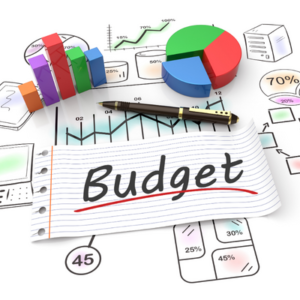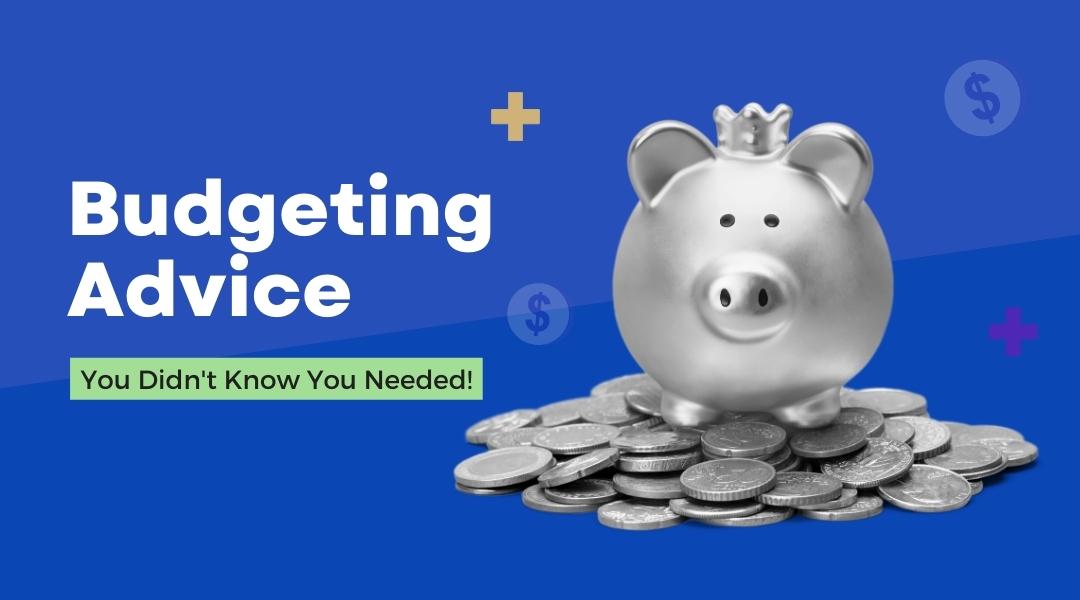2023 Budgeting Advice for Financial Freedom
Understanding the Purpose of a Budget
There is nothing worse than getting a surprise bill that you do not have the money to pay for. Even worse is watching your bank accounts slowly dwindle down to dollars and pennies each month, causing you to sweat and swear, as your thoughts are highjacked by your emotions and fears.
Yes, every day, many of us get up and going without a plan or direction when it comes to our money. We get hungry, so we drive through Starbucks. We love the look of the new purse we see while scrolling through Facebook, so we click on it and eventually give in.
Then BAM! Our car gets a flat tire and an invoice for $650 that we do not have!
“Why does this always happen to me?!” No one ever taught us that cars needed to get new tires every 10,000 miles, right?!
I will never forget the year that my husband and I had our first big money lesson that scared us into action. We had only been married a year and felt pretty good about where we were on our financial journey when it all came crashing down in April of 2005. I was working at a new job with a salary and he had just finished his first full year as a real estate agent making a pretty good income for a newly self-employed real estate agent. We had finished filing our first tax return together and our CPA called to let us know that we owed $4,500 to Uncle Sam.
Excuse me, $4,500 what?! Who owes $4,500?
“You and your husband owe $4,500 because he receives 1099 income where no taxes are taken out. You need to make a payment directly to the IRS this week.”
“We don’t have $4,500 to pay the IRS this week.”
Some people ignore these uncomfortable life lessons, and others growl at these situations, biting and clawing at anything and anyone who threatens their peace of mind.
A budget is an important tool for anyone who wants to get a handle on their finances, and also eliminates financial stress associated with surprise expenses. A budget can help you track your spending, save money, and make better financial decisions. But what is a budget and how do you create one? This blog post will answer those questions and give you the tools, tips, and guidance you need to create a budget that works for you.
Tracking Spending and Income: A Guide
A budget is an organized financial plan that outlines how you will utilize your financial resources over a period of time. There are many different types of budgets, but don’t get too caught up in which way is best in the beginning. Just get started and have a goal to make real progress!
 Everyone can benefit from a budget! Single parents, teenagers, married couples, business owners, and your preacher on Sunday. A budget will help you see clearly, assist in making smart decisions and result in not only peace of mind, but also more freedom to choose the life you want for yourself and the people it touches around you.
Everyone can benefit from a budget! Single parents, teenagers, married couples, business owners, and your preacher on Sunday. A budget will help you see clearly, assist in making smart decisions and result in not only peace of mind, but also more freedom to choose the life you want for yourself and the people it touches around you.
It helps identify where your money is coming from and where it’s going, helping you become more mindful of the financial choices you make and prioritize. By creating a budget, you can use it to track progress toward financial goals and gain financial security. With the right budget in place, you’ll be better equipped to reach both short-term and long-term goals with respect to your personal finances. Having a budget keeps you in control of your financial future by allowing you to keep on top of income, expenses, debts, savings, investments, and more! Ultimately, budgets empower us to take control of our financial lives and shape them into something that works for us.
It is also worth noting that budgets are not useful for just individuals and families, they are also an important concept for businesses, projects, and anything that involves making and spending money. If you are just getting started with budget planning, I recommend you start in just one area of your life and then expand into the other areas the more comfortable you get. For the purpose of this article, we are going to focus on creating a personal budget.
Tracking Spending and Income
Tracking your spending and income is an important step in budgeting. Having a budgeting plan helps you stay on track with your financial goals and ensures that you spend wisely. To make budget tracking easy, start by creating a budgeting worksheet or using an online budgeting app to enter all of your income sources and expenses, as outlined above. Record every income source on one side and every expense on the other side. It’s a great idea to check your budget at least once a week, so you can monitor how much money is coming in and going out each month. By tracking your budget regularly, you’ll be able to better understand where your money is spent, identify areas for savings opportunities, and make adjustments as needed.
One of my best tips to put yourself in a better position is to start with a discovery process to see how much you are currently spending. You can do this by taking 3 months of your bank account and credit card statements and adding everything up in categories, to see where your starting point is
much you are currently spending. You can do this by taking 3 months of your bank account and credit card statements and adding everything up in categories, to see where your starting point is
Some of the categories I put expenses into are:
- Food & Drinks- groceries, eating out, beer & wine
- Entertainment & Fun
- Family & Kids – daycare, sports, babysitters
- Home Expenses – mortgage payments, taxes, insurance, utilities
I do this every year at the end of September, and Wow was it an eye-opener when I first started!
Essential Steps to Create a Successful Budget
Creating a budget is the best way to make sure that your finances are organized, and the first step is taking time to review your income and expenses and decide on how you are going to track and use the budget. Creating a budget is not a once-and-done activity. It is something that once created, you will use over and over again, and into the next year. Taking the time to take financial control will be one of the best decisions you will make and it will give you confidence that will result in getting a head start on some of your biggest goals and dreams.
Step 1: Choose if you are going to create your own budget from scratch, and use a template or a mobile app. It doesn’t matter which way you manage your budget, there are many options available to use. I provided a few examples at the end of this section with links to poke around in them further. Once you decide which one you are going to use, you will want to first brainstorm and create a list of all the things that you spend money on and are paid money from.
Step 2: Remember to factor in all sources of income, including salary, investment income, and any other sources such as investments or rental income.
 Step 3: When it comes to expenses, both fixed and variable need to be included. Fixed expenses are things like mortgage payments, student loans, and any payments that do not change monthly. Variable expenses are the costs that change weekly and monthly, such as credit card bills, utilities, and grocery store purchases.
Step 3: When it comes to expenses, both fixed and variable need to be included. Fixed expenses are things like mortgage payments, student loans, and any payments that do not change monthly. Variable expenses are the costs that change weekly and monthly, such as credit card bills, utilities, and grocery store purchases.
It is also a good idea to make categories for long-term and misc expenses that will arise in the future. Examples of these are car maintenance, vacations, and gifts. You might not spend money on these things every month, but when they do come up, you will have planned for the amounts you need.
Step 4: Begin tracking income and expenses by choosing a routine for reviewing and entering your expenses on a weekly basis. This will make you more aware of what you are spending and give you the ability to slowly create room for extra money being funneled into categories you want.
Step 5: Begin entering all of your income sources and expenses on the budget template you decided to use, first entering the income, then deciding on an amount that seems appropriate for each expense category. You are outlining your ideal financial path with this step and it is going to be important in giving you a reality check when you compare what you think you should be able to spend compared to what you are actually spending.
Set goals for yourself for each area of spending, allowing you to decide how you want to best allocate funds based on personal priorities. This is where you can set goals to spend less in some categories, in order to increase what you set aside for other areas, such as saving for a down payment to buy a home.
Step 6: A good way to start with a budget is to set a time that you review and adjust categories, such as at the end of the month. Look at how you did, and celebrate small wins.
Taking these steps will help you build an effective budget that will benefit your financial health in the long run.
Money-Saving Tips: Make Your Budget Work for You
Even if you don’t have a steady income, it is still possible to save money each month. Start smaller by checking in with your current expenses and see what can be eliminated first. Seeing the smaller chunks of savings add up over time might even motivate you to find more cost-cutting strategies. By reprioritizing or cutting out unnecessary costs, you can put your money towards the things that really matter most for the long term.
The purpose of a budget is to set smart goals that you can track, so keep in mind that you aren’t going to make massive changes quickly. You need to take little steps when starting the budget process if you want to succeed. Once you get into a routine, you can update and set bigger goals as you get a more clear understanding of what you need to do.
Find ways to get creative when saving money. For example, I have four kids who are constantly asking me for money and things. Once they were old enough to help around the house and take part in our financial goals, I came up with ways that would both help them and me. I made a list of jobs that they could help me with and set a dollar amount on those things, so they could work to get the money they wanted to spend. One of the more creative ways I started saving money was to teach my oldest how much we could save by cutting coupons and using cash-back apps. I was too busy to keep up with this activity but knew that we could save monthly if I would make time. Instead, I told my daughter that every month she cut coupons and scanned receipts for me, and I would add half of the savings into her monthly allowance amount. It saved me money and helped her learn and earn at the same time.
me for money and things. Once they were old enough to help around the house and take part in our financial goals, I came up with ways that would both help them and me. I made a list of jobs that they could help me with and set a dollar amount on those things, so they could work to get the money they wanted to spend. One of the more creative ways I started saving money was to teach my oldest how much we could save by cutting coupons and using cash-back apps. I was too busy to keep up with this activity but knew that we could save monthly if I would make time. Instead, I told my daughter that every month she cut coupons and scanned receipts for me, and I would add half of the savings into her monthly allowance amount. It saved me money and helped her learn and earn at the same time.
Another way I began saving more money, was by setting up automatic savings deductions from my bank accounts. There are a bunch of mobile apps that will do this for you.
Acorn– is the first app that I did this with. Acorn rounds up to the dollar on any purchase you make. If you go to the gas station and spend $9.34, the app will take the other $0.66 and put it into an Acorn account that accumulates over time. A year later, I had over $1,000 saved just by rounding up!
Digit is another app that helps me save! One of my favorite things about Digit is that it is intuitive and sets aside savings based on parameters that you set within it. You can turn off the savings deductions anytime you choose to or transfer money back into your account. The best feature it has is savings categories, meaning you can set up goals for categories you are trying to save for:
Emergency Fund: $5,000
Real estate taxes: $3,800
African Safari: $10,000
I also have found some services that surprised me in the ways it has helped me save. Being a Mom of 4 very active kids, while running multiple businesses has made life pretty hectic and at times unmanageable. I started using apps that would save me time, like Instacart, where someone at the grocery store does the shopping for me and I simply pick up my groceries when they are ready. By doing this, I discovered I spend less money on food than if I went to the store and did the shopping myself. My grocery bills were totaling almost $100 less than when I shopped in the store.
Here is a link to check out Instacart: LINK HERE
Use Code for $20 off: PAPA9620FD
Don’t be discouraged, and make a plan which takes into consideration both short and long-term goals – you’ll be on track with your finances in no time!
What to Do if you Overspend or Are Experiencing Financial Difficulties
If you have ever overspent or faced unexpected expenses, you know the stressful feeling money problems can cause. To help prevent this in the future, create an emergency fund to cover emergency and variable expenses. This will keep your finances protected should an emergency happen again. You can decide on a fixed amount each month that gets added to the emergency fund until you reach your desired savings goal. Additionally, budgeting your spending and tracking your progress can help you become aware of any variance from expected expenses. Once you have taken these precautions, you’ll be well-equipped to avoid future overspending and emergency situations with more ease!
- Sell items that you are no longer using – I was surprised at how much you could earn by bringing any clothes that were name-brand and in good shape to a consignment store in my local town. I normally would donate these items, but when things get tight, every little bit adds up!
- Challenge the way you have always done things. My husband is a cable guy through and through, but slowly I was able to get him to switch over to streaming channels that had everything we needed and at half the cost.
The Benefits of Sticking to a Budget
The benefits of sticking to a budget are endless. When taking the time to review spending habits and develop an effective plan, allows you to make mindful spending decisions that will benefit you in the long run. A budget can help you save money for important expenses, check progress toward financial goals, and even grow your savings account by forcing you to think about spending in terms of priorities instead of impulse decisions. In short, sticking to a budget is the best way to increase control over your finances and empower yourself with the ability to feel secure and worry-free about spending.
 And make sure to reward yourself when you have hit a specific goal. If you have never been able to save money and by following a budget routine, you are working toward having $2,000 in your savings account, celebrate when you hit this milestone! You can even print a picture of the reward you will get when you hit the goal. It might seem counterintuitive to spend money on something after all your savings, but it is important to motivate yourself for a job well done. Understanding your driving force for all your hard work is an important part of succeeding with budgets and financial planning.
And make sure to reward yourself when you have hit a specific goal. If you have never been able to save money and by following a budget routine, you are working toward having $2,000 in your savings account, celebrate when you hit this milestone! You can even print a picture of the reward you will get when you hit the goal. It might seem counterintuitive to spend money on something after all your savings, but it is important to motivate yourself for a job well done. Understanding your driving force for all your hard work is an important part of succeeding with budgets and financial planning.
Having a budget is an important tool for financial success and well-being. It not only helps you track your spending and income but gives you the power to make informed decisions with confidence. Following these five steps of creating a budget and keeping track of your expenses, it can help relieve some of the stress of managing money.
If you are a business owner, you will really want to check back in with us as we are releasing budgeting for a business blog in the next few weeks. If you thought I had some good suggestions for your personal budget, you are going to devour the budgeting and planning tips I am going to be sharing in that roundup.
Mortgage Consultation Today!
Categories
- Credit (4)
- FHA Loans (3)
- Finances (3)
- First Time Home Buyers (6)
- Grab Bag (7)
- Home Technology (1)
- Homebuying Tips (17)
- Inspiration (1)
- Insurance (3)
- Interest Rates (3)
- Loan Process (1)
- Mortgage Financing (14)
- Motivation (1)
- News (1)
- Press Release (8)
- Renovation (2)
- Self Employed (1)
- Tips & tricks (1)
- Uncategorized (134)
- USDA Loans (1)
- VA Loans (2)




